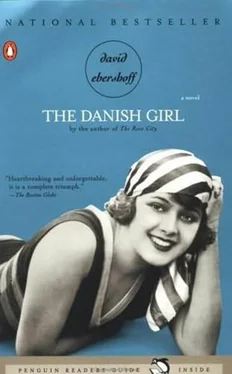And outside another cloud shifted, opening a larger pale-blue hole in the sky, and the river brightened and the sailors in their coats looked heavenward, and Lili thought and held her breath and then said, “Elbe. Lili Elbe.”
That afternoon she went downstairs to take her tea in the Wintergarten . She found a metal chair off by itself, and soon Lili felt the sun on her face through the glass. The day had opened up, and now the sky was blue. The sun had warmed the solarium enough to fill the air with the showery smell of the curling-arm ferns and the ivy climbing strings tacked to the walls. The Wintergarten looked down to the Elbe, and the wind that had swept away all the clouds was whitecapping the river. The whitecaps reminded Lili of the Kattegat in Denmark, and the paintings that Einar had done of the winter sea. Years ago, Lili used to sit in the rope-bottom chair in the Widow House and stare at Einar’s paintings; she would look at them with a sense of detachment, as if they had been painted by an ancestor of whom she was vaguely proud.
During that week, Lili slept late in the mornings; it was as if the more rest she got, the more tired she became. In the afternoons she’d take her tea and torte in the Wintergarten . She would sit there in the metal chair, her teacup balanced on her knee, nodding shyly at the other girls who came down for gossip. Occasionally one of them would laugh so loudly that she would draw Lili’s eye: a circle of girls, young girls, with longish hair and healthy throats, each swelling at her own pace beneath the regulation gown with the cabled cord-belt. Most of the residents were at the clinic for that reason, Lili knew; and out of the corner of her eye she would watch them not with scorn or pity but with interest and longing, for the girls all seemed to know one another and none of them-from the way their high-pitched laughs would shoot around the Wintergarten at such a force that Lili thought for sure those silver-ball peals would shatter the glass walls-seemed to care in the least that they were living in the Dresden Municipal Women’s Clinic for the next several months. The clinic seemed like a society, one that had not yet inducted her. Maybe one day, she told herself, feeling the sun on her knees and on her wrists, which she overturned so that the undersides could feel the warmth that had begun to seep into the rest of her.
She knew that Professor Bolk wanted her to gain weight. Frau Krebs would bring her a dish of rice pudding in the afternoons, thoughtfully hiding an almond in it in the Danish way. The first time Lili spooned the clumpy pudding into her mouth and tasted the hard, ribbed seed of the almond, she lifted her eyes and said, in Danish, forgetting where she was, “Tak, tak.”
On her third day at the clinic, Lili was sitting in the Wintergarten when she noticed the green shoots of crocuses on the other side of the glass wall. They were bright and trough-shaped, and they were huddling in the breeze. They looked bold against the patchy brown lawn, which Lili imagined unfurling into a carpet of green over the next several weeks. The river was flowing the color of oil today, the current slow and carrying a low-sitting freighter whose deck was covered by black tarps pulled tightly with rope.
“Do you think spring will come early?”
“I’m sorry?” Lili said.
“I noticed you were looking at the crocuses.” A girl had somehow taken the metal chair next to Lili, pulling it at an angle so that they could look at each other across the white cast-iron table.
“They seem early to me,” Lili said.
“It’s what I would expect for this year,” said the girl, whose woody blond hair fell past her shoulders, whose nose turned up at the end. Her name would turn out to be Ursula, an orphan from Berlin, not yet twenty and landed in Dresden because of the simplest of mistakes. “I thought I loved him,” she would later say.
The day after they met, the sun was even stronger. Lili and Ursula, wrapped in roll-neck sweaters and fur hats with ear flaps borrowed from Frau Krebs, headed into the park. They walked down the path that led through the field of crocus shoots, which had now spread like a rash. Out there, overlooking the Elbe, in a breeze that was more ferocious than Lili could ever have guessed from inside the Wintergarten, Ursula asked, “And you, Lili? Why are you here?”
Lili thought about the question, biting her lip and burying her wrists inside her sleeves, and finally said, “I’m ill inside.”
Ursula, whose mouth naturally pouted up, said, “I see.”
From then on the two girls took their tea and torte together each afternoon. They would choose chocolates from one of the many boxes Ursula had smuggled out of her last place of employment. “It’s these chocolates that caused all my trouble,” Ursula said, holding up one shaped like a seashell and then pushing it into her mouth. Ursula told Lili about the chocolate shop on Unter den Linden where she had worked, where the richest men in Berlin hurried in at lunch or at five o’clock, their topcoats hanging over their arms, to buy three-layered boxes of chocolates wrapped in gold foil, the packages tied up in a satin ribbon. “You probably think it was one of them who I loved,” Ursula told Lili, setting her teacup into its saucer. “But it wasn’t. It was the mixing boy in the back, the boy who dumped the sacks of walnuts and the tubs of butter and the buckets of milk and the ground cocoa beans into the vats.” Vats big enough for two young lovers to curl up into. His name was Jochen, and he had freckles from head to toe. He was from Cottbus, near the Polish border, in Berlin to make his fortune but now indentured to the stainless-steel vats and the mixing arm whose blade, were he not careful, could catch his bony hand and turn it around a hundred times in less than a minute. It was four months before Ursula and Jochen spoke, the girls in front in their pink button-up uniforms forbidden to speak to the mixers in the back, where the air was hot and smelled of sweat and bittersweet chocolate and filled with language that mostly revolved around the private parts of the girls stationed behind the glass cases at the front of the shop. Then one day Ursula had to go into the back to ask when the next batch of nougat would emerge, and Jochen, who was then just seventeen, pushed his cap back on his head and said, “No more nougat today. Tell the jerk to go home and apologize to his wife instead.” That was when Ursula’s heart filled up.
The rest Lili could imagine: the first kiss in the back room; the gentle tumble into the bowl of the stainless-steel vat; the passion in the middle of the night when the chocolate house lay still, when all the mixing arms hung motionless; the sobs of love.
How very sad, Lili thought, sitting in her metal chair as the afternoon sun hit the Elbe. In five fast days she and Ursula had become friends. And despite Ursula’s current predicament, Lili longed for something similar to happen to her. Yes, she told herself. It will be like that with me: instant love; helpless, regrettable passion.
The next morning Professor Bolk appeared in the door of her room. “Please don’t eat anything today,” he said. “Not even cream with your tea. Nothing at all.” Then he added, “Tomorrow’s the day.”
“Are you sure?” Lili asked. “You won’t change your mind?”
“The amphitheater is scheduled. The nurses’ shifts have been assigned. You’ve gained some weight. Yes, I’m sure. Tomorrow is your day, Lili.” Then he was gone.
She went to breakfast in the hall with the arched windows and the pine-plank floor and the side table laid with plates of rolled meats and baskets of caraway-seed rolls and an urn of coffee. Lili took her coffee to a table in the corner and sat alone. She ran a butter knife under the seal of a tissuey blue envelope and opened a letter from Greta.
Читать дальше












